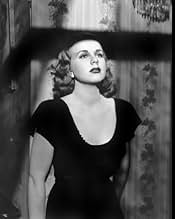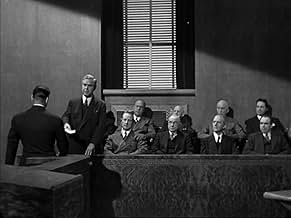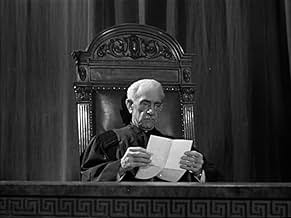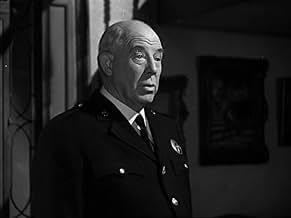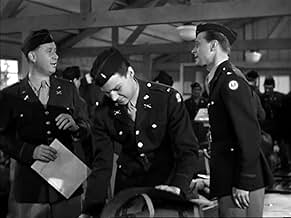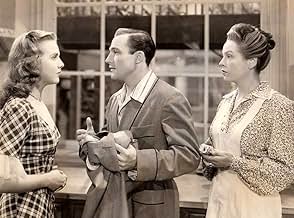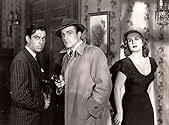IMDb RATING
6.4/10
1.8K
YOUR RATING
A young femme-fatale realizes that the man she married is an incorrigible wastrel.A young femme-fatale realizes that the man she married is an incorrigible wastrel.A young femme-fatale realizes that the man she married is an incorrigible wastrel.
- Director
- Writers
- Stars
- Nominated for 1 Oscar
- 1 nomination total
Eddie Acuff
- Steve
- (uncredited)
Fred Aldrich
- Bartender
- (uncredited)
Frank Austin
- Jury Member
- (uncredited)
John Barton
- Concertgoer
- (uncredited)
Vangie Beilby
- Wedding Guest
- (uncredited)
John Berkes
- Waiter
- (uncredited)
Oliver Blake
- Defense Attorney
- (uncredited)
Charles Cane
- Joe
- (uncredited)
Wheaton Chambers
- Plane Passenger
- (uncredited)
Ruth Cherrington
- Concertgoer
- (uncredited)
James Conaty
- Concert Patron
- (uncredited)
- Director
- Writers
- All cast & crew
- Production, box office & more at IMDbPro
6.41.8K
1
2
3
4
5
6
7
8
9
10
Featured reviews
One of Deanna Durbin & Robert Siodmak's best
I was lucky enough to catch a rare screening of this never-on-video film at the Cinematheque here in Hollywood last night. It was very beautiful, moving even, with lovely black-&-white cinematography by Woody Bredell. Other users' comments to the contrary, Gene Kelly's role is most definitely not insignificant - he's the villain, for crying out loud! His genuinely complex and subtle performance is a real standout in a film filled with wonderful work by all of the actors. Gale Sondergaard, also, is clearly well-cast, too, as Kelly's mother; she may have been a little young for the role in real life, but that certainly doesn't come across in her portrayal of the stifling, weak-willed, coddling mother of a killer. Deanna Durbin, though always more of a performer than an actor per se, is more than convincing as a world-weary singer in a whorehouse (not a night club; though it's never explicitly identified as a house of ill repute, only the most boneheaded viewer would take it for anything else). Her tearful breakdown in the church during Christmas Eve mass (an exquisitely rendered set piece, full of deep, soft shadows and luminous pools of communal light) is genuinely touching and heartfelt. And the film's final moments, if accepted unironically (as they were intended), are truly poetic and uplifting.
Marriage is a Troubled Affair
"Christmas Holiday" (Universal, 1944), directed by Robert Siodmak, is an interesting drama with "film noir" elements, (based on the story by W. Somerset Maugham which changes the local from Paris to New Orleans), starring two performers long associated with musical-comedy, Deanna Durbin and Gene Kelly (on loan from MGM), in their only film together. Deanna Durbin's long awaited dramatic role, with two songs thrown in for good measure, might have earned her an Academy Award nomination, but didn't. Due to its lack of television revivals during the last couple of decades, "Christmas Holiday" just remains only a memory to anyone who has any recollection of ever seeing it.
The story begins with Lieutenant Charlie Mason (Dean Harens) about to have Christmas leave from military service to return home and marry his fiancée, Mona, but he receives a letter written by her that reads that she has married someone else. When his plane lands in New Orleans due to a bad rainstorm, Mason, quite depressed, makes the acquaintance with Simon Fenimore (Richard Whorf), a reporter, who invites him to accompany him to a night club managed by Valerie De Merone (Gladys George). While there, Mason meets Jackie Lamont, a night club singer (Deanna Durbin), and after she finishes vocalizing, "Spring Will Be a Little Late This Year," Jackie has Mason accompany her to a church. During the Mass, she starts to break down and cry. Mason covers up by placing his coat over her. He then escorts this troubled girl to a diner where she tells him her story: (Flashbacks reveal Jackie to be Abigail Martin. She meets Robert Manette (Gene Kelly). They fall in love and are soon married. Their marriage is happy and blissful for six months until Abigail learns that her husband, a troubled gambler, has just murdered his bookmaker. Abigail goes through a series of unpleasant circumstances during her husband's trial, especially when Robert's domineering mother (Gale Sondergaard) gives her a hard slap across her face for not having been a stronger influence on him after her son is found guilty and sentenced to serve time in prison.) Forwarding to the present: Abigail finishes her revealing story to Mason. She later learns that Robert has escaped from prison and is out to get her, adding more to her troubles.
When I first saw "Christmas Holiday" in one of its very rare television presentations on a PBS channel in 1982, I was moved by it and Durbin's performance from start to finish, and have never forgotten it. Possibly watching this movie again after so many years, I would not have that same reaction I had the first time, but otherwise, it still brings a new kind of experience in seeing Durbin in a serious role, that shouldn't go unnoticed. Durbin sings two songs, "Spring Will Be a Little Late This Year," and her lovely rendition to Irving Berlin's "Always." I was even surprised to find Gene Kelly playing a role against type. Still new to movies (making his debut in 1942), his dramatic acting comes off somewhat awkward. I've seen Kelly act in other serious roles, some good, some not, but his character in this production is definitely unsympathetic. He even gets a chance to carry a gun and use it in a shoot out. No dancing for him here unless he's dodging bullets bouncing from the floor. As for Gale Sondergaard, she looks too young to be playing Kelly's mother, a role that would have been far better suited to the likes of Margaret Wycherly (best remembered for her gangster mother role in James Cagney's in "White Heat" (1949)), but Sondergaard doesn't disappoint with her domineering performance over her "Momma's boy."
Also seen in the supporting cast is Universal contract player, David Bruce playing Gerald Tyler. Bruce would soon be elevated to Durbin's co-star in her only Technicolor musical, CAN'T HELP SINGING (1944).
Yes,"Christmas Holiday" is a rare find indeed, a different kind of Christmas story, the one that doesn't get to be added in the package of other Christmas movies that air annually on television, including all versions to "A Christmas Carol" (1938), "It's a Wonderful Life" (1946) and/or "Miracle on 34th Street" (1947). While this movie has never been presented on classic cable channels like American Movie Classics, it's currently available (as of 2006) in the VHS format and can be purchased through Movies Unlimited. I recommend seeing it, at least once, if not for its dramatic content, but for its casting. (***)
The story begins with Lieutenant Charlie Mason (Dean Harens) about to have Christmas leave from military service to return home and marry his fiancée, Mona, but he receives a letter written by her that reads that she has married someone else. When his plane lands in New Orleans due to a bad rainstorm, Mason, quite depressed, makes the acquaintance with Simon Fenimore (Richard Whorf), a reporter, who invites him to accompany him to a night club managed by Valerie De Merone (Gladys George). While there, Mason meets Jackie Lamont, a night club singer (Deanna Durbin), and after she finishes vocalizing, "Spring Will Be a Little Late This Year," Jackie has Mason accompany her to a church. During the Mass, she starts to break down and cry. Mason covers up by placing his coat over her. He then escorts this troubled girl to a diner where she tells him her story: (Flashbacks reveal Jackie to be Abigail Martin. She meets Robert Manette (Gene Kelly). They fall in love and are soon married. Their marriage is happy and blissful for six months until Abigail learns that her husband, a troubled gambler, has just murdered his bookmaker. Abigail goes through a series of unpleasant circumstances during her husband's trial, especially when Robert's domineering mother (Gale Sondergaard) gives her a hard slap across her face for not having been a stronger influence on him after her son is found guilty and sentenced to serve time in prison.) Forwarding to the present: Abigail finishes her revealing story to Mason. She later learns that Robert has escaped from prison and is out to get her, adding more to her troubles.
When I first saw "Christmas Holiday" in one of its very rare television presentations on a PBS channel in 1982, I was moved by it and Durbin's performance from start to finish, and have never forgotten it. Possibly watching this movie again after so many years, I would not have that same reaction I had the first time, but otherwise, it still brings a new kind of experience in seeing Durbin in a serious role, that shouldn't go unnoticed. Durbin sings two songs, "Spring Will Be a Little Late This Year," and her lovely rendition to Irving Berlin's "Always." I was even surprised to find Gene Kelly playing a role against type. Still new to movies (making his debut in 1942), his dramatic acting comes off somewhat awkward. I've seen Kelly act in other serious roles, some good, some not, but his character in this production is definitely unsympathetic. He even gets a chance to carry a gun and use it in a shoot out. No dancing for him here unless he's dodging bullets bouncing from the floor. As for Gale Sondergaard, she looks too young to be playing Kelly's mother, a role that would have been far better suited to the likes of Margaret Wycherly (best remembered for her gangster mother role in James Cagney's in "White Heat" (1949)), but Sondergaard doesn't disappoint with her domineering performance over her "Momma's boy."
Also seen in the supporting cast is Universal contract player, David Bruce playing Gerald Tyler. Bruce would soon be elevated to Durbin's co-star in her only Technicolor musical, CAN'T HELP SINGING (1944).
Yes,"Christmas Holiday" is a rare find indeed, a different kind of Christmas story, the one that doesn't get to be added in the package of other Christmas movies that air annually on television, including all versions to "A Christmas Carol" (1938), "It's a Wonderful Life" (1946) and/or "Miracle on 34th Street" (1947). While this movie has never been presented on classic cable channels like American Movie Classics, it's currently available (as of 2006) in the VHS format and can be purchased through Movies Unlimited. I recommend seeing it, at least once, if not for its dramatic content, but for its casting. (***)
Suddenly Last Christmas...
Hmmm, I wonder of Tennessee Williams saw this in 1945 and wrote SUDDENLY LAST SUMMER as a riff on this astonishing incestuous masochistic noir. Universal's 1944 "Christmas Holiday"is a startling dark film that is quite explicit in its adult themes of prostitution, self punishment, sexual manipulation, incest and some quite twisted emotional ideas. It even has scenes similar to that same 1959 Taylor Montgomery Hepburn drama. Cleverly, Universal cast music stars Gene Kelly as the handsome spoiled son with the demon mother (Gale Sondergaard) and cherubic Deanna Durbin as the adoring slavish young woman that Mother encourages he marries to keep his amoral unethical character in check. The idea that Mother enthusiastically endorses their marriage so she can control both of them by their sexual desire for each other is a rank idea as slimy as seen in the pre code shocker THE SILVER CORD. I personally found the film riveting and I very much liked the casting against type. For me it gave the film excellent surprise value. Kelly made a terrific seductive rat. Durbin's slide into willing prostitution to 'be with him' in a decadent lifestyle (while he was away) is a great downbeat storyline. Everything about "Christmas Holiday" is deceptive, right from the happy title to the handsome horror of Kelly's character. I will not spoil the story for you other than to say the whole film is a terrific ride, and with a ripe explicit tone, you will be seduced yourself. Plenty of flashback like SORRY WRONG NUMBER and equally as creepy. What a surprise! Hilariously, in Australia it was our Nationwide TV treat at 8.30pm on Christmas night! Haven't our TV programmers got a sly sense of humor.
A Real Treat
What a surprise treat to see this rare film as part of a Robert Siodmak Festival at the Cleveland Art Museum in the summer of 2014. It put me back in the mid-WWII period and the beautiful, pristine 35mm print was shown as originally presented on the big screen, thanks to Film Curator John Ewing.
The major attraction here is that Deanna Durbin and Gene Kelly both play against type in a "doctored up" Somerset Maugham story. Siodmak direction is dark, atmospheric and smoothly executed throughout. Deanna sings Irving Berlin's "Always" in a pop style very effectively. A good portion of Wagner's "Liebestod" from Tristan and Isolde is heard in an orchestral setting to heighten the dramatic proceedings.
Both stars work surprisingly well in their very heavy roles, and I found myself glued to the screen during Durbin's depiction. Her acting style has often been subtle, and this performance was one of her most understated. Kelly's role challenged him to reach dramatic heights, and he rises to occasion.
While some of the script is dated, Deanna dominates the screen whenever she's on, and is matched by a fine supporting cast. Truly a worthwhile viewing.
The major attraction here is that Deanna Durbin and Gene Kelly both play against type in a "doctored up" Somerset Maugham story. Siodmak direction is dark, atmospheric and smoothly executed throughout. Deanna sings Irving Berlin's "Always" in a pop style very effectively. A good portion of Wagner's "Liebestod" from Tristan and Isolde is heard in an orchestral setting to heighten the dramatic proceedings.
Both stars work surprisingly well in their very heavy roles, and I found myself glued to the screen during Durbin's depiction. Her acting style has often been subtle, and this performance was one of her most understated. Kelly's role challenged him to reach dramatic heights, and he rises to occasion.
While some of the script is dated, Deanna dominates the screen whenever she's on, and is matched by a fine supporting cast. Truly a worthwhile viewing.
Siodmak's film noir from a Somerset Maugham novel...
DEANNA DURBIN begged Universal to let her play a dramatic role after her great success in a string of mostly mediocre films where she played a Little-Miss-Fixit in featherweight romantic comedies who sang operatic ditties with great skill and charm. She was always involved in a scheme to reunite her mother and father for the final clinch.
Here, she handles her very adult role with competence, quite believable as a torch singer in a disreputable nightclub, a troubled woman seeking redemption for problems in her twisted past relationships with a mother and son (GALE SONDERGAARD and GENE KELLY).
Deanna shines in the role, giving it shades of both simplicity and charm while playing the happy bride, but convincing when she becomes the bruised and fragile woman who manages to tell her tale of woe to a young lieutenant. The soldier is nicely played by DEAN HARENS, an officer on Christmas leave who is on his way to San Francisco when a storm forces his plane to land in New Orleans.
The film structure is not always smooth, burdened as it is by a couple of flashbacks in the middle and a rather weak ending that is over too abruptly. But Robert Siodmak and cameraman Woody Bredell give the whole piece a fluid style with long tracking shots and superior cinematography for several key scenes, notably the one that takes place at a church service on Christmas eve, and another in a concert hall.
Durbin's fans will certainly appreciate her rendering of "Spring Will Be A Little Late This Year" and Irving Berlin's haunting ballad "Always." The background music, a mixture of popular songs and classical pieces, is effective, especially for all of the nightclub scenes. Hans J. Salter deservedly won an Oscar nomination for his detailed and meticulous score.
Effective supporting performances from GALE SONDERGAARD, GLADYS GEORGE and RICHARD WHORF strengthen the tale. Well worth watching. Oddly enough, Deanna handles her dramatic chores in much better style than Gene Kelly, who's unable to do much with his role of a weak-willed wastrel who turns to crime for reasons unexplained.
Trivia note: David Bruce has a small role at the beginning. Two years later he'd be co-starring with Deanna in much bigger parts in CAN'T HELP SINGING and LADY ON A TRAIN.
Here, she handles her very adult role with competence, quite believable as a torch singer in a disreputable nightclub, a troubled woman seeking redemption for problems in her twisted past relationships with a mother and son (GALE SONDERGAARD and GENE KELLY).
Deanna shines in the role, giving it shades of both simplicity and charm while playing the happy bride, but convincing when she becomes the bruised and fragile woman who manages to tell her tale of woe to a young lieutenant. The soldier is nicely played by DEAN HARENS, an officer on Christmas leave who is on his way to San Francisco when a storm forces his plane to land in New Orleans.
The film structure is not always smooth, burdened as it is by a couple of flashbacks in the middle and a rather weak ending that is over too abruptly. But Robert Siodmak and cameraman Woody Bredell give the whole piece a fluid style with long tracking shots and superior cinematography for several key scenes, notably the one that takes place at a church service on Christmas eve, and another in a concert hall.
Durbin's fans will certainly appreciate her rendering of "Spring Will Be A Little Late This Year" and Irving Berlin's haunting ballad "Always." The background music, a mixture of popular songs and classical pieces, is effective, especially for all of the nightclub scenes. Hans J. Salter deservedly won an Oscar nomination for his detailed and meticulous score.
Effective supporting performances from GALE SONDERGAARD, GLADYS GEORGE and RICHARD WHORF strengthen the tale. Well worth watching. Oddly enough, Deanna handles her dramatic chores in much better style than Gene Kelly, who's unable to do much with his role of a weak-willed wastrel who turns to crime for reasons unexplained.
Trivia note: David Bruce has a small role at the beginning. Two years later he'd be co-starring with Deanna in much bigger parts in CAN'T HELP SINGING and LADY ON A TRAIN.
Did you know
- TriviaBecause of the Hays Code, screenwriter Herman J. Mankiewicz changed the setting from a Paris brothel to a nightclub in New Orleans, and changed the main character from a prostitute to a more ambiguous nightclub singer and hostess, in adapting the 1939 novel of the same name by W. Somerset Maugham.
- GoofsAfter Robert breaks out of jail, the newspaper spells his last name as "Mannette". However, the correct spelling is "Manette".
- Quotes
Simon Fenimore: [to Charles] The planes are all grounded, the trains won't do you any good, and you're too big for me to carry on piggyback.
- ConnectionsReferenced in Go, Johnny, Go! (1959)
- How long is Christmas Holiday?Powered by Alexa
Details
- Release date
- Country of origin
- Language
- Also known as
- W. Somerset Maugham's Christmas Holiday
- Filming locations
- St Vibiana RC cathedral, Main St, Los Angeles, California, USA(midnight mass scene)
- Production company
- See more company credits at IMDbPro
- Runtime
- 1h 33m(93 min)
- Color
- Aspect ratio
- 1.37 : 1
Contribute to this page
Suggest an edit or add missing content


